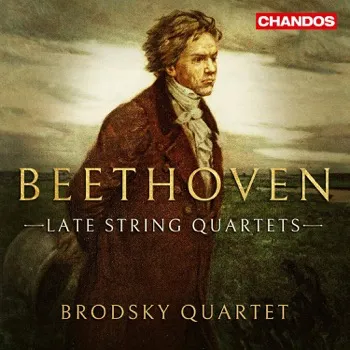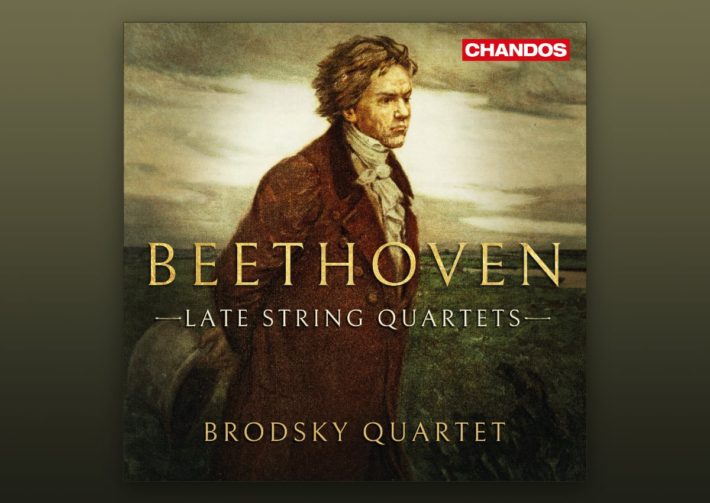Goethe once described the string quartet as “four sensible persons conversing (…) you profit from their discourse, and you get to know their several instruments.” Would he have said such a thing about Beethoven’s late quartets? By this point in his life, Beethoven was completely deaf and struggling with both physical and mental illness. These musical “conversations” are rarely, if ever, “sensible.” In these late works, Beethoven presents his deepest hopes, desires, struggles and fears with disarming intimacy. So, a successful performance of this music requires not only a staggering technique, but a fervent desire to understand and communicate Beethoven’s soul-bearing openness.

Listing the many virtues found in this three-CD set by the Brodsky Quartet requires far more space than can be accommodated here. Suffice it to say, each performance offers numerous moments of stunning technical and emotional achievement: the fierce bravado of the first movement in the op. 95 “Serioso” quartet (CD 1, track 1); the masterful pacing of the four movements in the op. 127 quartet (CD 2, Tracks. 1-4); the unanimous vision that captures the frenzied chaos of the Grosse Fugue (CD 1, track 11); the hectic, rapid-fire mood swings that make up the second movement of Quartet No. 16., immediately answered by gorgeous cantabile playing in the next movement (CD 3, tracks. 7 and 8). The list could go on, but in order to remain concise, I’ll focus on the Brodsky’s performance of the op. 132 A Minor Quartet (CD 3, tracks. 1-5).
The Brodsky Quartet begin the first movement on the threshold of audibility, the four-note motive (on which the entire movement is based) passing between each player in an atmosphere of utter desolation. At 0’48” the allegro begins with the first violin suddenly wandering away from the others with a brief melismatic passage. In a modified sonata form, the music is a fruitless search for true stability and repose. Each time stability seems within its grasp, the music veers off into more harmonic wandering. The overall mood is restless and unsettled, feelings vividly conveyed in this performance.
The third movement, lasting 19’37,” is daringly slow, but the Brodsky’s are superb at sustaining the long melodic line. Subtitled “Heiliger Dankgesang” (Sacred Song of Thanksgiving), Beethoven wrote this movement as a hymn of praise and thankfulness for better health. The Brodsky’s unanimity of attack, care for articulation and dynamic markings, varied usage of vibrato, and meticulous voicing ensure a performance of overwhelming poignancy.
The fourth movement is a short, banal march, meant to shock the listener out of the transported mood from the previous music – a technique Mahler often used in his symphonic writing. The march dissolves into a recitative (played by the first violin) that leads directly into the final movement, a sonata-rondo that determinedly builds up momentum until the music erupts into the joyous, life-affirming coda. The Brodsky players are fully attuned to every sudden emotional gearshift, and their joy in the playing of this music is audible and palpable.
Listening to this set can be a small revelation, as many Beethoven listeners tend to focus on the orchestral and piano works. Spending a good deal of time listening to this music, one soon realizes he or she is missing out on some of Beethoven’s most sublime music. Undoubtedly, the consistent quality of these performances brings that realization home more forcefully.
The liner notes by William Drabkin are exemplary: scholarly, engaging and thorough. Chandos recording is excellent, creating a soundstage in which the four players are surrounded by a warm resonance that never impedes clarity. This label has issued many recordings in the past few years in super-audio sound, and it does seem like a missed opportunity to have not done so with these performances. 2020 is the 200th anniversary of Beethoven’s birth, which means we will surely see hundreds of new Beethoven recordings this year, but I am confident the Brodsky Quartet’s new recording can hold pride of place in any collection this year and for years to come.
Beethoven – Late String Quartets
String Quartets Op. 95, 127, 130, 131, 132, 135, Große Fuge, Op. 133
Brodsky String Quartet
Chandos, 3 CDs, CHAN 20114




















